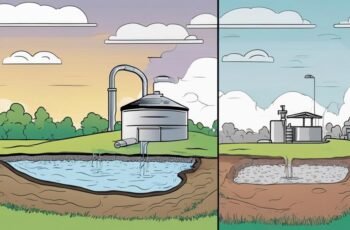If foul odors persist despite your septic system treatments, it may signal an issue with their effectiveness. Keeping bacterial populations in balance is important for odor prevention. Monitoring water quality near your system is vital; high nutrient levels like nitrogen could indicate problems. Be alert for system backups, as they suggest drainage issues. Regular maintenance, including tank monitoring and drain field inspections, is necessary for peak functionality. Inspection results, such as excessive solid waste buildup or bacterial growth, provide insights into treatment efficacy. Check all aspects carefully to make sure your septic system is working effectively.
Key Takeaways
- Regular inspections ensure treatment effectiveness.
- Lack of odors indicates proper bacterial balance.
- Water quality tests confirm treatment success.
- Reduced backups indicate treatment efficacy.
- Maintaining a clean tank promotes treatment efficiency.
Odor Control
When evaluating the effectiveness of septic system treatments, one important aspect to take into account is odor management. Odors emanating from your septic system can be indicative of underlying issues such as imbalances in bacterial populations or ineffective chemical treatments. To maintain proper odor management, it is essential to keep the right balance of bacteria in your septic system. This bacterial equilibrium is crucial for breaking down waste effectively and preventing foul smells. Additionally, septic tank cleanliness plays a significant role in odor management. Regular pumping and maintenance can help prevent odors from escaping the tank and permeating your property. Moreover, the health of your drain field is directly linked to odor management. A well-maintained drain field allows for proper wastewater dispersal, reducing the likelihood of odors seeping into the air. By focusing on chemical effectiveness, bacterial balance, septic tank cleanliness, and drain field health, you can effectively combat odors and ensure your septic system is operating at its best.
Water Quality
To assess the effectiveness of septic system treatments, one crucial aspect to take into account is the impact on water quality. When evaluating water quality in relation to septic systems, consider the following:
- Bacteria Levels: Monitor the presence of harmful bacteria in water sources near your septic system to ensure treatment efficacy.
- Nutrient Levels: Keep an eye on levels of nutrients like nitrogen and phosphorus, as high concentrations can indicate septic system issues.
- Contamination Sources: Identify potential sources of contamination such as leaking pipes or overflows to pinpoint areas needing attention.
- Pollution Prevention: Implement measures to prevent pollution from reaching water sources, like regular maintenance and proper waste disposal practices.
Regularly testing water quality parameters can provide valuable insights into the efficiency of your septic system treatment. By staying vigilant and proactive in monitoring bacteria and nutrient levels, addressing contamination sources, and practicing pollution prevention, you can help maintain a healthy water quality around your property.
System Backups
In septic systems, the occurrence of system backups can present significant challenges. System backups often indicate underlying drainage issues within the septic system. When backups happen, wastewater is prevented from flowing out of the system properly, leading to potential overflows and backups within the home or property. These blockages can result from various factors such as clogs, tree root intrusions, or system malfunctions. Regular use of a reliable septic tank treatment like SEPTIFIX can help maintain ideal system performance and reduce the chances of backups.
If system backups are not addressed promptly, they can pose serious risks to the environment and public health. One major concern is groundwater contamination. When sewage backs up into the yard or home, there is a high risk of harmful pathogens and pollutants seeping into the groundwater supply. This contamination can affect not only your property but also neighboring areas and water sources.
Regular maintenance and timely intervention are essential in preventing and addressing system backups to safeguard against drainage issues and groundwater contamination. If you notice any signs of backups, it is vital to act promptly to protect your septic system and the environment.
Regular Maintenance
System backups in septic systems highlight the significance of regular maintenance to achieve peak functionality. To guarantee your septic system operates effectively, focus on the following key areas:
- Monitor Tank Levels: Regularly check your septic tank levels to prevent overflows and guarantee proper waste breakdown. High levels indicate potential issues that need attention.
- Inspect Drain Field: Keep an eye on the drain field's condition to ensure proper absorption of effluent. Wet spots or foul odors near the drain field could indicate a problem.
- Schedule Pumping: Adhere to a regular pumping schedule based on your household size and water usage to prevent solid buildup in the tank, which can lead to blockages and backups.
- Practice Water Conservation: Be mindful of water usage to prevent overwhelming the septic system. Excessive water can flood the tank and hinder proper treatment.
Inspection Results
After conducting a thorough inspection of your septic system, the results reveal significant insights into its current condition and functionality. By analyzing the tank levels, we can determine if there is an excessive buildup of solid waste, indicating a need for pumping. Monitoring the drain field during the inspection helps identify any signs of saturation or clogging, which could impede proper wastewater treatment.
Effluent analysis provides vital data on the quality of the wastewater leaving the septic system. It allows us to assess the levels of harmful contaminants and the effectiveness of the treatment process. Additionally, examining bacterial growth in the septic tank can indicate whether the system is breaking down waste efficiently.
Interpreting these inspection results accurately is crucial for ensuring the proper functioning of your septic system. Regular inspections help prevent major issues and maintain the longevity of your system. Remember, staying informed about your septic system's performance empowers you to make informed decisions regarding its maintenance and treatment.

